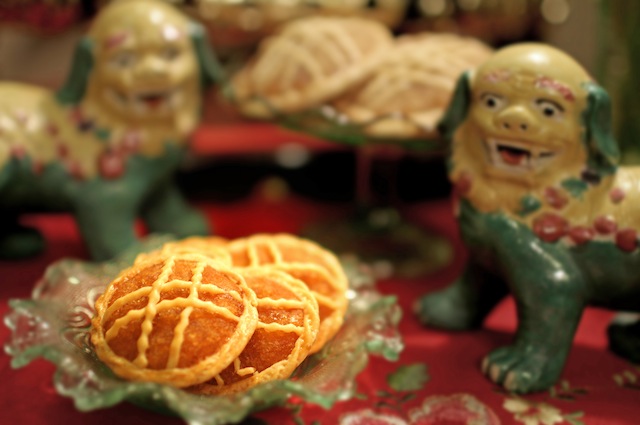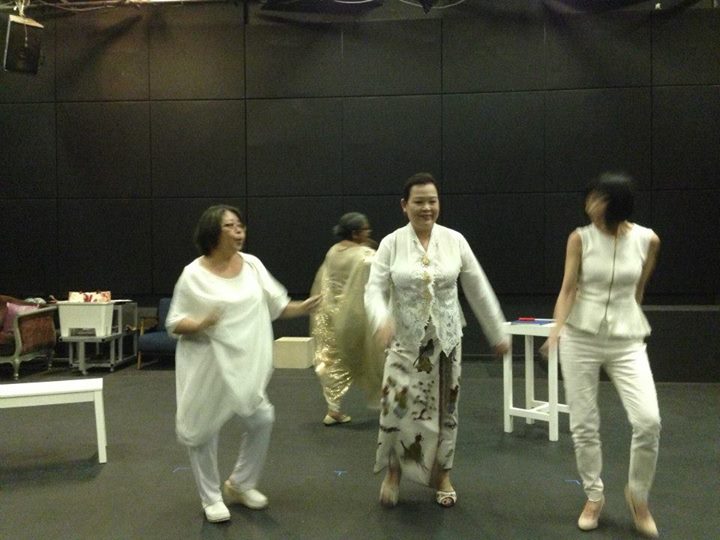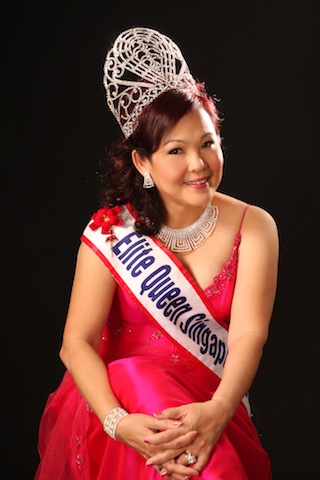Keeping the Peranakan culture alive
One woman’s mission is to not let the Peranakan heritage fade away without a hard fight!
BY: Eleanor Yap
Irene Ong has been doing her best to keep her Peranakan roots alive, and in the minds of the Singapore public. The 60-year-old grew up in a Peranakan household and was immersed with the food, language and its colourful culture. As she grew up, she made sure she kept her past connected to her in some way.
She not only married a Peranakan, she also became a part owner of a Peranakan restaurant called True Blue Cuisine, and as an actress, she has been playing Peranakan roles. However, as much as she holds on dearly to her past, she is fully aware that through her family, this sixth-generation Peranakan is a dying breed.
Ageless Online talks to her about her love for her Peranakan heritage and the various ways that she is keeping it alive, and why she feels a good thing doesn’t last forever:
Your love for Peranakan pastries including the traditional ones like crispy pineapple tarts, kueh bangkek/bangkit, fruit cake, almond and peanut cookies, started out as a hobby. How did it then become ‘bread and butter’ for you?
My grandaunt handed down 10 handwritten recipes to my mother who then handed them down to me. My grandaunt taught my mother as she helped her bake in the kitchen. My mother later specialised in nonya kueh and used to make family favourites that take much work such as kueh chara (a green pancake), love letters/kueh belandah (a crispy wafer) and apom balek (turnover pancake in English). As my mother died at 53 when I was 26, the recipes that were handed down consisted mainly of ingredients and I didn’t know how to bake so I went to learn at the community centres.
During Chinese New Year, I would bake for friends and colleagues mainly the traditional pineapple tarts that I grew up with, the ones that are hard and big. The soft ones are more common and baked by Chinese, while the hard ones are not often made these days as they take a lot of work to do. If I didn’t try baking the recipes from my grandaunt, they would have become no value and likely I would have chucked them.
My baking later became ‘bread and butter’ when I joined my cousin (Benjamin Seck or Baba Ben as he is fondly known) in his restaurant (which has a shop in the front as well as two other shops at the Peranakan Museum – a boutique selling sarong and antique jewellery, and a pantry serving up laksa and chicken curry). I usually bake the hard pineapple tarts once a week to sell alongside the other Peranakan pastries at our shops. The recipes that my grandaunt gave have been passed to my cousin as he loves making the kueh kueh for the restaurant. Every few months, he comes up with something new or he modifies the recipes. The recipes just make it easier for him!
Even 10 years later, Peranakans tend to bake the same things. However, they tend not to make those that take a long time like the kueh chara.
Can you share a glimpse of your Peranakan childhood?
I came from a family of 17. I was actually the only child but I had a lot of cousins and aunts. You would think that being an only child was lonely but being in a tight-knit Peranakan family, I didn’t feel like an only child as there were lots of people always in the house and we were all very close.
When I was younger, I learned a lot about the Peranakan festivals such as kneeling down to elders including aunts and uncles, or those in the 50s and 60s and wishing them a long life. My 32-year-old son, Ryan, will not kneel down and wish me a long life. I doubt if his future children will also understand the Peranakan culture.
It must be tough being a dying breed.
I feel sad that I am considered the last generation of Peranakans as my son doesn’t believe in celebrating Chinese New Year and probably doesn’t know when it is! He is very Western. When I was younger, I wanted to marry a Peranakan man, which I did and doubt if my son will do so with a Peranakan woman. Nowadays, there are not a lot of 100-percent Peranakans, meaning those who immerse themselves in the culture, speak the language, marry into a Peranakan family, etc. Also, many Peranakans tend to marry non-Peranakans.
If I compare myself with my cousins, I would say I am more Peranakan as I listened to my grandaunts’ stories when I was younger as I love the culture while they would be running around the house.
So tell me about your foray into the restaurant business.
My cousin used to get called from the TV station to help put together ingredients for Peranakan dishes so its actors and actresses could make them. I often would go with him. We ended up talking and the idea to start a Peranakan restaurant was brought up. We started the restaurant in Katong in 2003, while I was still working at a MNC as a personal assistant to the senior vice-president of Asia-Pacific. However, in 2005, when we decided to move the restaurant to Armenian Street and near the Peranakan Museum, I became full-time. I am in charge of the administration for all the shops and I help in the restaurant when needed.
I went into the business not really for financial reasons but more out of passion, and to keep the Peranakan culture going as I felt it was fading.
Besides you helping with the restaurant, you are also busy with acting. How did you get into acting in the first place?
In 2001, I got involved in the Gunong Sayang Association (a Peranakan social club that stages dramas regularly). It started out me doing two to three lines on stage as they didn’t trust me and was worried I would make a mistake. There was an audition for the show “The Ways of the Matriarch” which was aired on TV12.
I decided to audition as I wanted to be a Peranakan lady, however, I ended up as a Chinese maid. People said I sounded funny as a maid but I guess they felt I could pass as a Chinese maid. I did 29 episodes during the three years. Then came a number of TV roles with MediaCorp and I did a TV series for Eu Yang San called “Bertha’s Nest” (which aired on Channel News Asia) playing a Chinese mother (Bertha) who was rather controlling of her daughter. It ended after eight episodes.
After that, I did some one-off roles on TV and then I decided to concentrate on Gunong Sayang shows and dabble in some writing. At the time, I was also with the Main Wayang Co (the first professional Peranakan cultural arts and community theatre company). I was one of the actresses playing the “Golden Girls”. The Golden Girls were a regular feature in the Main Wayang Co plays. I played the Golden Girl who was very serious and always telling people about the Peranakan culture. (Writer’s note: Sounds like this is playing out in true life too).
Currently, I work with the Peranakan Siblings, and another group by The Necessary Stage called Theatre For Seniors (TFS). The Peranakan Siblings was set up by my cousin Benjamin and I. We do traditional Peranakan skits (in English) for Peranakan stage and for charity shows.
Seems like Peranakans are often viewed negatively. Why is that?
Frankly, they think they are very atas (meaning high class in English) people and they are often clinging onto their glorious days before World War II. It is no wonder they don’t come up as very good people. However, what is a lovely part of being Peranakan is the culture.
Tell me about your writing for plays.
I write one Peranakan play to be staged every year. This year, I wrote ‘Oh… Singapore’ and worked with Saedah Samat-Alkaff for the music and Najib Soiman, who directed. My plays are in English with some Peranakan patois as I hope the interest in the language will live on. I also would like to teach classes where the speech is Peranakan. It is not Malay! We have our own language called Peranakan patois which is Malay mixed with Hokkien like we say kamsiah instead of terima kasih. This language is reflected in the True Blue Cuisine menu such as ikan goreng sambal is called ikan goreng sambair.
You have had a rather flowered life and done many different things. Any regrets?
I consider myself on my last lap of life. On my dying bed, I would want to say I have done it all. If you ask me now, I would say I have done it all.
In 1995, I went back to school part-time and got a law degree. I always wanted to be a lawyer however, my mother was against spending money to educate a woman. She wanted me to get married and have children so I felt I had some unfulfilled dreams. When I got the law degree, I couldn’t be a lawyer as at the time, there were a lot of commitments such as family, as well as my age. However, I don’t regret getting the degree as it has helped me a lot especially in assessing problems.
Once I was a beauty queen. I joined two pageants including Classic Mrs Singapore (a category for married women 45 to 65) and Elite Queen Singapore (for married women above 50). I joined because I wanted to get a feel for it. I feel in life, you should try different things.
I really think I have done it all. I am very fulfilled as I am doing the things that I want to do. I still get some money from my restaurant and I can act when I feel like it.
** Catch Irene at Singapore’s first senior forum theatre performance! “Take Me or Leave Me!” by The Necessary Stage’s Theatre for Seniors runs from January 18 to 19, 2013, 3pm, at the Esplanade Rehearsal Studio. Admission is free. For more information, visit www.singaporefringe.com.





0 Comments